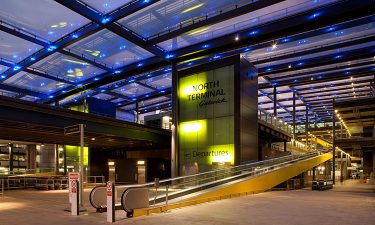
London
The initiative will help to reduce traffic congestion and emissions for the surrounding area, as well as act as a deterrent for a car-led recovery once more regular travel resumes following the lifting of the current COVID-19 national lockdown. The charge will also create a vital new revenue stream for the airport, providing further protection for local jobs as the negative economic impacts of the pandemic continue.
Anyone who does not wish to pay the charge will be able to drop-off or pick-up passengers in the airport's long-stay car parks with two hours free parking and a free shuttle bus to the terminal. Alternatively, passengers can arrive by public transport, taking advantage of the significant improvements to train and bus services to the airport in recent years.
By encouraging other forms of journey to the airport, the charge will help Gatwick to continue to meet its commitment to reduce 'Kiss and Fly' – the least sustainable type of journey to the airport, as it involves two return car journeys - and may contribute to a reduction in traffic at Gatwick and surrounding local areas.
In 2019, around 15 per cent of airport journeys were 'Kiss and Fly'. Reducing the airport's environmental impact continues to be an important focus, and Gatwick will make a contribution from the revenue into Gatwick's existing
“This new scheme will also encourage passengers to consider more sustainable transport options, including taking advantage of our excellent public transport services. We plan to use this charge to build on these services by using a proportion of the revenue raised to support new sustainable transport initiatives, in addition to our ongoing project to build a new £150 million airport train station, which is progressing well," he added.
The charge will be £5 for 10 minutes and £1 for each additional minute, up to 20 minutes. The maximum charge will be £25 and the maximum length of stay is 30 mins.
The charging system and enforcement will be managed using convenient barrier free technology and by Automatic Number Plate Recognition cameras. Passengers using the system will be able to pay online using a range of payment methods. Marshals will also be on hand in the forecourts to assist passengers.
Blue badge holders will be able to access the forecourt free of charge by registering their details up to three months in advance before arriving at the airport.
When the charge is introduced for the
A Red Route system is being introduced across the airport campus to indicate that stopping to park, load or unload, board or alight from a vehicle is prohibited. Revenue raised through Red Route fines will also be used to fund sustainable transport initiatives under the guidance of the airport's
The airport already benefits from strong public transport links, with recent improvements enabling a train leaving for
Gatwick also remains committed to its investment in the ongoing £150 million project to upgrade the airport's train station, which will make connections to other destinations easier by doubling the size of the station concourse, adding five new lifts and eight escalators to improve passenger flow and widening two platforms to reduce overcrowding.
© Russell Publishing Limited, 2021. All Rights Reserved., source




